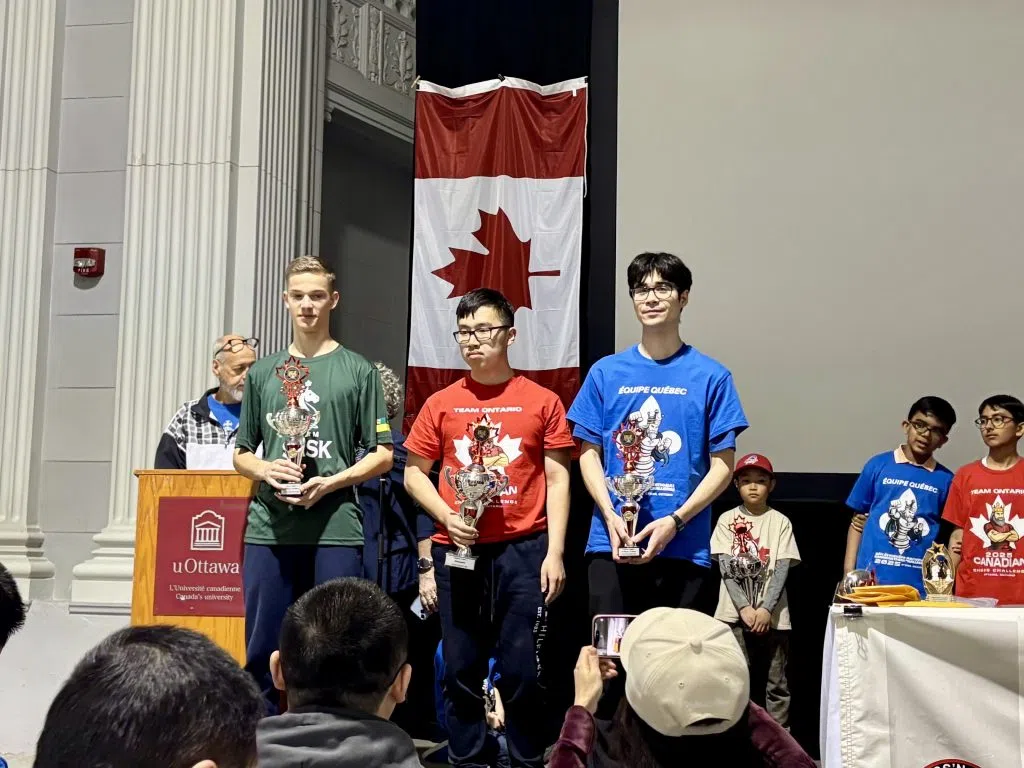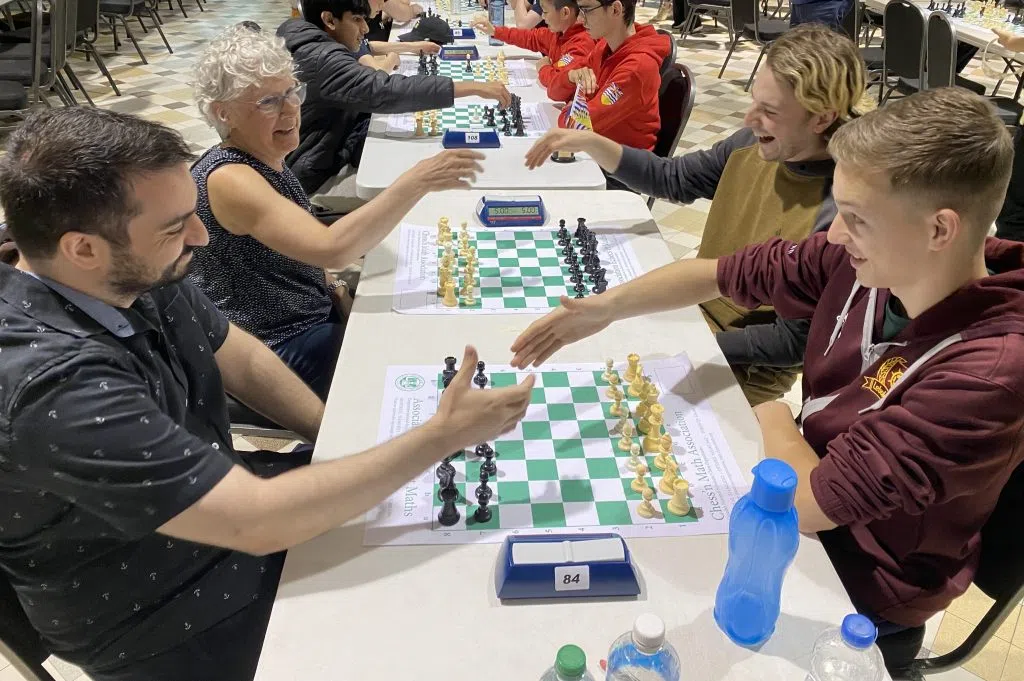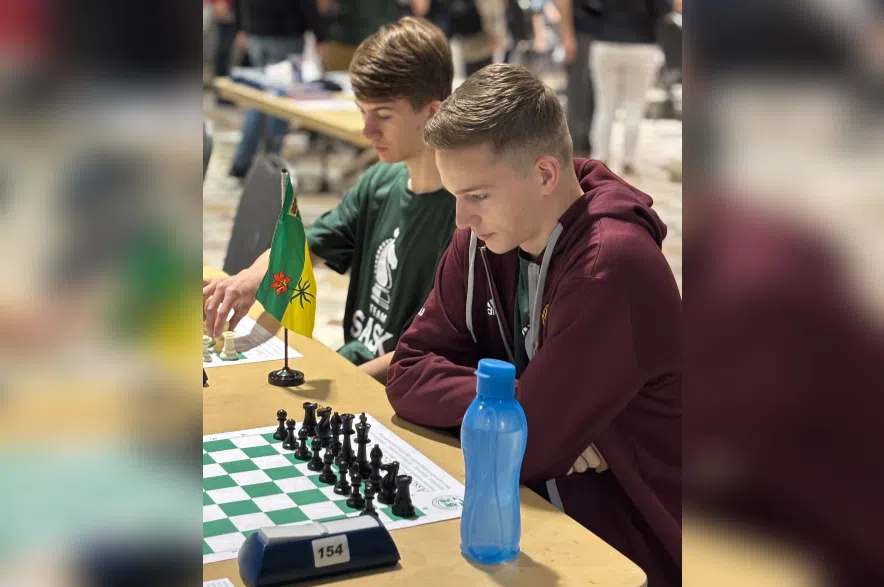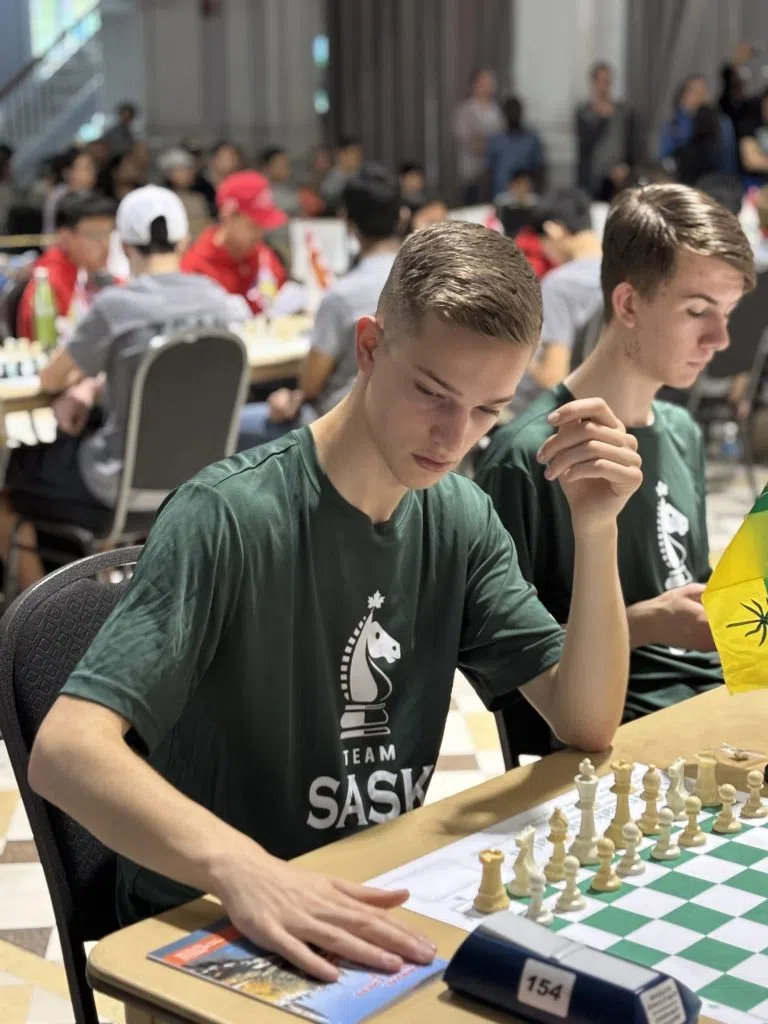From Grade 4 onwards, Regina’s Salkeld has participated in the Canadian Youth Chess Nationals, and in his final year as a high school senior, he came home with a silver medal and earned the title of National Candidate Master.
Read more:
- ‘Crucial weapon’ Tommy Stevens back on the field for the Riders
- Former world chess champion may face discipline for allegations against Daniel Naroditsky
- Saskatoon cop facing assault charge after SIRT investigation
The trips across Canada for various chess tournaments wouldn’t be possible without the help of Salkeld’s neighbours through bottle drives.
Every year, he would write handwritten letters to people in his neighbourhood asking for donations.
Now, he’s taking on another role: instructor. He continues to compete, but wants to share his love and knowledge of the game with others, no matter their age or skillset.
Salkeld joined The Evan Bray Show to talk about his journey with chess and what’s next for the young National Candidate Master.
Listen to the full interview here, or read the transcript below:
The following transcript has been edited for length and clarity.
Evan Bray: How long have you been playing chess?
Tobias Salkeld: My brother and I learned the moves from my dad when we were really young, maybe two or three.
At two or three, we learned the rules. We didn’t know much strategy. That’s what my dad tells me. I don’t know how much we understood at that age, but that’s when we started.
Bray: So your dad must love chess, too?
Salkeld: Yeah, he likes chess. He’s not a super advanced player, but he likes the game. He liked it enough to teach it to us.
Bray: how did that progress?
Salkeld: Neither my brother nor I played too much until I was in Grade 4, and he was in Grade 3. We had just moved to Regina, and we got into chess a bit more. We were playing online a little, getting better at the game, and learning some strategy. And then some friends of ours in Regina told us about a regional scholastic chess tournament, which was actually the first step towards nationals.
We had no aspirations of going to nationals at that point, but we thought we’d go have some fun, play some chess. And then somehow both of us won regionals, qualified for provincials in Saskatoon, and then we went to provincials, and somehow we actually both won our Grade at provincials, which was a bit of a surprise.
So the way it works is there are regionals in Regina and Saskatoon for each Grade from 1 to 12, and then there’s provincials in Regina or Saskatoon — it alternates back and forth — but there’s one provincial tournament for Saskatchewan.
Then you’ll have 12 provincial champions, one for each grade. And then those 12 players make up team Saskatchewan, and they’ll go to wherever nationals are, which moves around the country. And then they’ll play against the nine teams from the other nine provinces.
Watch Evan and Tobias Salkeld go head-to-head in a round of chess:
Bray: So it was at that national competition that you placed second?
Salkeld: Yes, this year.
Bray: How many times have you competed in nationals?
Salkeld: I’ve gone seven times, starting in Grade 4. And then there was one year that was cancelled because of COVID-19, so there were no nationals. And then one year, I lost in a tie-breaker at provincials.
Bray: When you have the title National Candidate Master, what does that mean?
Salkeld: I got that title in July. I went to the Canadian Open in Vancouver, B.C., and that’s the biggest annual chess tournament. It’s open to all ages and all levels. But it’s a very, very strong field of competition. There were a few Grand Masters — which is the highest chess title — at the tournament. I played really, really well at that tournament, and I got a high enough rating that they awarded me the title of National Candidate Master. I met the rating requirement.
Bray: When it comes to how you play chess, do you have a style? Is there such a thing as a style in chess?
Salkeld: Yeah, definitely. I think some players are more aggressive. They prefer sharper, tactical positions where there are lots of traps and stuff going on. Then some players prefer more closed or slow games where you kind of try to outmaneuver your opponent positionally.
I would say I’m more of an aggressive player. I prefer more open attacking positions, but as a chess player, you have to know how to play both.
Bray: What’s the shortest and what’s the longest official chess tournament game you’ve played?
Salkeld: Over the last nine or so years, I’ve played a lot of youth tournaments against people in my grade, specifically at nationals. Kids usually like to play pretty quickly. I think I’ve had a few games that were only a couple of minutes long, where the kid was just blitzing out the moves, and the game ended pretty quickly.
For serious tournaments, the time control of those games is called Classical, and it means that each player has 90 minutes to make all their moves, and every move they make, they get an additional 30 seconds. So games can take a long time. I think the longest I’ve played was probably around six hours.
Bray: How much does it set the stage for the game as to whether or not you get the first move or your opponent?
Salkeld: White always moves first. I think that matters more at the highest levels of chess. At a lower level—even at my level of chess—it’s not a huge difference, and I think it’s mostly preference. You’ll end up playing different openings at the start of the game, depending on which side you’re playing.

Salkeld came home with some hardware following the national tournament in Ottawa. (Tobias Salkeld/Submitted)
Bray: There’s no luck really involved? Is it all strategy?
Salkeld: Yeah, not so much. It’s all strategy. Even for a game like poker, for example, where people say it is a skillful game — and I agree — but there is some luck with the cards that come up, and the cards you dealt.
But in chess, all the information is completely available to both players. It’s just who can assess that information better and make better decisions. I guess you could say there’s some luck involved if things happen in the chess game that neither of you saw, because it’s just really deep or really complicated. It can feel a little lucky sometimes. But really, in principle, there’s no luck in chess.
Bray: You are actually doing some coaching now. You started a little business on the side. How’s that going?
Salkeld: Pretty well. I’ve got quite a few students, actually, but I’m looking for more. About a month ago, I started coaching one student who was interested. They were a previous bottle drive donor, and they were looking for lessons. So I started coaching them to kind of get a feel for coaching. Then, just a couple of weeks ago, I put out a more public call for students.
Bray: Have you got a big tournament coming up? What are your dreams?
Salkeld: Nationals go up to Grade 12, so I’m done with that now, as I graduated high school last year. But my younger brother is now in Grade 12 and he might make nationals this year, which would be cool.
I also have a brother in Grade 4 who’s interested in chess, so I’m training him right now, and hopefully he’ll make the team and be able to go to nationals, which is in Winnipeg this year. I’ll be going with an older friend of mine who’s been coaching Team Sask. for a bit. He used to play on it too. So we’ll kind of be the two coaches. We’ll take the 12 kids to Winnipeg. So that’ll be fun.
For my personal chess goals. I’ve got the Southern Alberta Open coming up in November. So that’s my next tournament that I’m preparing for.

Salkeld plans to keep competing, but also wants to share his love and knowledge of the game with others. (Tobias Salkeld/Submitted)
Bray: Is there a world stage that you’d like to grasp someday?
Salkeld: When you’re a kid, there’s a system where you can make it to worlds. I never did that. But now that I’m an adult, I’ll just play in bigger and bigger tournaments, and the goals are to get a higher rating and higher titles. So right now, I just got the National Candidate Master title this summer, and then my next goal will be National Master, which is the highest title that the Canadian Chess Federation gives out.
Bray: What does your chess set look like at home?
Salkeld: I have one set at home. I think it’s quartz or some kind of crystal, ao the board is pretty heavy. I think the board is marble, actually, and the pieces are pretty nice, but I think one of the pawns is already broken. They’re pretty fragile. So usually I just play with a rubber board and plastic pieces.
Read more:












